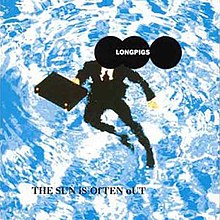| The Sun Is Often Out | ||||
|---|---|---|---|---|
 | ||||
| Studio album by | ||||
| Released | 29 April 1996 | |||
| Recorded | 1995–1996, Axis Studios, Sheffield | |||
| Genre | Britpop, alternative rock | |||
| Length | 63:26 (including hidden track) | |||
| Label | Mother | |||
| Producer | Kevin Bacon, Jonathan Quarmby | |||
| Longpigs chronology | ||||
| ||||
| Singles from The Sun Is Often Out | ||||
| ||||
The Sun Is Often Out (stylized as THE SUN iS OfTEN oUT) is the debut album by Longpigs, released in 1996 on U2's record label, Mother Records. [1]
Contents
Five singles were released from the album, initially to little success. The first two—"She Said" and "Jesus Christ"—both failed to crack the UK Top 40, both stalling at No. 67. The third single, "Far", fared a little better, scraping into the Top 40, reaching No. 37 and receiving significant radio airplay, particularly on the national pop and rock radio station, BBC Radio 1. However, the next single, "On and On", would be the band's breakthrough single, reaching No. 16 in the UK. With this momentum the album was released in April, and shortly after, "She Said" was re-released, also making it to No. 16 in the UK singles chart. The final single from the album, "Lost Myself", narrowly missed giving the band a third successive Top 20 single, stalling at No. 22.